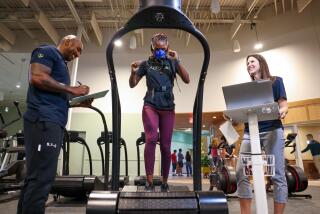Feel-Good Programs Working Well : Companies Are Helping Their Employees Get Healthier
- Share via
Walt Disney Productions Inc. decided last March that wishing upon a star would not help its employees lose weight, quit smoking or exercise more often.
So Disney put together an “Employee Wellness” program for its 3,000 Los Angeles-area workers. The program is an attempt to get employees to lead healthier lives by attending monthly seminars on everything from better nutrition to stress management. The thinking is, the employee who feels better also works better, and the company saves on health care costs and lost work days.
So successful is this program that after less than a year the company is preparing to spread the seminars corporate-wide to all 30,000 employees from Disneyland to Disney World. “It’s grown very big very fast,” said Sharon Harwood, who oversees the program as supervisor at Disney University in Burbank.
$350 Billion for Health Care
As a company concerned about the health of its workers, Disney is not alone. In Orange County, a growing number of employers are prompting their employees to shape up, according to health experts attending an “Employee Wellness” seminar sponsored by UC Irvine in Garden Grove Wednesday.
The health concern is well warranted. Americans spent more than $350 billion on health care last year, and the typical company spent more than $1,400 per employee on health care costs, industry experts estimate. “But modern medicine can’t help you with everything,” said Kevin M. Olsen, vice president at Martin Luther Hospital Medical Center in Anaheim. “You have to help yourself, too.”
The leading killer of Americans is not in the genes that we inherit from our parents, but in the often deadly life styles we lead, Olsen said. It is clearly in the interest of companies, then, to coax employees to improve their health by showing them how to kick the smoking habit or how to stop overeating.
“Most corporations spend more to keep their equipment running than they do to keep their employees running,” Olsen said.
Detailed employee surveys of six Orange County companies, taken by Martin Luther Hospital, revealed that nearly one-quarter of the workers were smokers; another one-quarter were overweight; and nearly two of three workers said they don’t get enough exercise.
Robert W. Allen, whose company took part in that survey, is vice president of administration at EECO Inc., a Santa Ana computer systems manufacturer. By offering incentives such as special T-shirts and jackets, Allen said, he has lured more than half of EECO’s 650 employees to participate in various wellness programs.
“Setting up a wellness program can be the single biggest thing that anyone can do for (an) organization,” Allen said. The 3-year-old program at EECO shaved company health care costs 4% last year and saved the company another $50,000 by reducing absenteeism, he said.
The measures that companies take to improve employee well-being range from the simple to extremely complex. Commodore MOS Technology of Costa Mesa offers its 300 employees hefty membership discounts at a local health club. Nearly one-third of them have joined, said Paula Salat, the firm’s personnel manager.
Tests Measure Fitness
But Control Data Corp., the Minneapolis-based computer company, has a far-reaching corporate program that closely measures employee fitness through a series of written and physical tests. More than 16,000 of its employees nationwide have joined the voluntary program.
At Control Data’s Communications Systems Division in Anaheim, about 2,400 workers participated in the program last year. A company-sponsored program to get smokers to quit had a 30% success rate. And a nutritional seminar encouraged more than half the participants to stop adding butter and salt to their foods, said Jeanne R. Waite, West Coast area manager of the program.
Food sold at the work place is often a nutritional nightmare, said Susan R. Keagy, a San Diego-based consulting nutritionist. Company vending machines commonly are loaded with nutrition-starved foods such as candy, cookies, potato chips, soda pop and coffee. “The coffee break has become the time to get a caffeine shot and a sugar hit that will keep you going for the next few hours,” said Keagy.
Some companies are starting to offer alternatives, such as fresh fruit or low-sugar snacks, in their machines, she said.
100 Workers Quit Smoking
At Hughes Aircraft Co.’s Ground Systems Group in Fullerton, a stop-smoking program helped more than 100 workers quit the habit, said Patricia Crane, a health education consultant who conducts stop-smoking clinics.
A successful stop-smoking incentive at many companies is an employee “honor roll,” she said, where reformed smokers get their names on plaques and also receive monetary rewards.
But it is the stress that leads to bad habits such as smoking and overeating that is the real threat to health, said Edward L. Harmon, president of Harmon & Associates, a Newport Beach-based management company.
Many people feel extreme stress in situations that are out of their control--traffic jams, for instance. Traffic tie-ups are not worth getting upset about, he said, because the anger cannot change the situation. “What’s the difference,” asked Harmon, “between a guy who gets upset because the sun sets too early, and the guy who gets riled because he’s stuck in traffic on the Santa Ana Freeway?”
More to Read
Inside the business of entertainment
The Wide Shot brings you news, analysis and insights on everything from streaming wars to production — and what it all means for the future.
You may occasionally receive promotional content from the Los Angeles Times.










